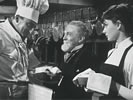Eye For Film >> Movies >> Sabrina (1954) Film Review
In this rags-to-riches meets ugly-duckling story, Audrey Hepburn plays Sabrina Fairchild, the daughter of the chauffeur to the wealthy Larrabee family of Long Island. Sabrina watches from the sidelines as David Larrabee (William Holden), the profligate younger son, romances a series of giggling blondes at society parties and never notices her longing stares and infatuated glances. To try to snap her out of it, her father sends her to a Paris cooking school, which is, of course, presided over by your standard comedy Frenchman. Encouraged by an aristocratic classmate she learns the ways of the world and is soon well on her way to being a sophisticated young woman.
Upon her return home, almost unrecognisable, hilarity ensues as the elder Larrabee son, Linus (Humphrey Bogart), tries to direct her attentions away from his brother and back to Paris so as not to upset the rigid social order.

Audrey Hepburn's wide-eyed looks and swoony mannerisms are perfect for the part of the dreamy teenager in love, and her theatrical suicide attempt is played with the perfect balance of overblown drama and black comedy, complete with melodramatic suicide note declaring that the object of her affection “probably wouldn’t even cry” at her funeral. As she is rescued by Linus from an undignified suffocation from eight car exhausts, we get the first inkling of the romantic hijinks to come.
Linus is the more serious and gentlemanly of the brothers, apparently enough of a gentleman to recognise the symptoms of a fainting spell before the lady in question has even begun to sway. Bogart plays the character quite subtly, not really letting the audience in on his motives or true feelings at any point. For a purportedly romantic story this can be a problem, but it makes for a more intriguing experience for the viewer than is average. Linus’ relationship with Sabrina demonstrates no particular grand passion, but instead has more of the feel of a firm friendship. This is a movie that is not as frivolous as it first appears.
The comedic side of the romantic comedy formula is largely successful, with a mixture of slapstick, word play and physical humour that works very well to keep the film interesting between romantic interludes. Some of the jokes are telegraphed pretty far in advance (once a man puts champagne glasses in his back pocket, there’s really only one way things can go) but are executed with enough panache so as to still be amusing when they finally show up.
Great use is made in this movie of the famous French song La Vie En Rose, serving both as a signifier of Sabrina’s social and romantic intentions and attitudes, and as a romantic evocation of Paris and bohemian European ways intruding upon a stuffy American family’s cosy existence. She evokes in the (significantly older) Larrabee brothers a sense of youth and life, a feeling which the viewer cannot help but engage with too.
Reviewed on: 20 Feb 2009



















